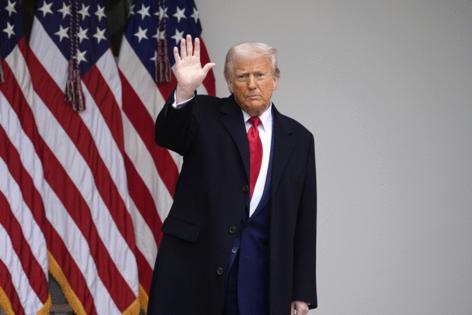Trump plans executive order on flag burning, NewsNation reports
Published in News & Features
President Donald Trump plans to issue an executive order on flag burning, NewsNation reported, a move that aims to crack down on burning the American flag without running afoul of a 1989 Supreme Court decision that ruled doing so was protected speech.
Under the order, set to be signed Thursday, the Justice Department would review cases involving flag burning to see if charges could be brought that weren’t specific to the flag burning itself, such as public nuisance or disorderly conduct laws, NewsNation said citing two unnamed administration officials.
Trump has long sought to impose penalties for flag burning, floating punishments including a prison sentence or a loss of citizenship after winning his first presidential election.
He highlighted the issue repeatedly during his third presidential campaign, and in 2024 suggested he could seek a constitutional amendment to ban that form of protest. He reiterated his call to impose penalties in June while speaking at Fort Bragg in North Carolina, saying that he was working with senators to pass a law giving jail time to flag-burning protesters and suggesting a yearlong sentence.
“People that burn the American flag should go to jail for one year. And we’ll see if we can get that done,” Trump said.
Days later, Senator Josh Hawley, a Missouri Republican, introduced legislation that sought to add an additional year in jail to federal sentences for crimes that involved flag burning.
The U.S. Constitution broadly protects speech and peaceful protest, and courts have long held that political speech is among the most sacrosanct forms of speech. The U.S. Supreme Court in 1989 ruled in a 5-4 decision that burning a flag itself is a form of political expression protected under the First Amendment and cannot be made illegal.
Congress then passed a new law banning flag burning, which was also overturned in a subsequent Supreme Court case. Efforts to amend the constitution to prohibit flag burning have fallen short of the two-thirds majority needed in both chambers of Congress. Republican Senate Leader Mitch McConnell of Kentucky provided the crucial vote to stop a 2006 attempt in his chamber.
Flag desecration emerged as a political issue amid the convulsions of the 1960s after some Vietnam War opponents began burning flags as a form of protest. In the decades that followed, punishment of flag burning became a cultural flash point in tensions over deference to patriotic norms versus protection of the right to expression. The issue again resurfaced in recent years when flags were burned at pro-Palestinian protests and demonstrations against federal immigration enforcement efforts.
During the last presidential campaign, demonstrators burned a flag at Washington’s Union Station to protest Israeli Prime Minister Benjamin Netanyahu’s address to Congress — drawing condemnation from both Trump and Democrat Kamala Harris.
____
(With assistance from Mike Dorning.)
©2025 Bloomberg L.P. Visit bloomberg.com. Distributed by Tribune Content Agency, LLC.







Comments